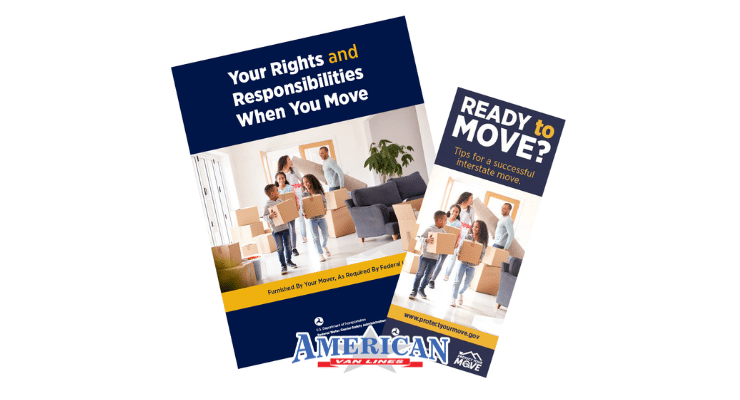The Federal Motor Carrier Safety Administration (FMCSA), which regulates interstate moving companies, requires licensed long-distance movers to post the agency’s Moving Rights and Responsibilities pamphlet. The pamphlet describes in detail both your rights and your responsibilities as an interstate transportation customer in America. Your mover knows all this information, and you should too, if you want to negotiate a solid deal.
“The primary responsibility for protecting your move lies with you in selecting a reputable household goods mover or household goods broker,” the document says, “and making sure you understand the terms and conditions of your contract and the remedies that are available to you in case problems arise.” We encourage you to spend 10 minutes reading and digesting this 22-page document. Use the pamphlet to help you:
- Learn the difference between binding and non-binding estimates
- Understand interstate transportation regulations
- Recognize which movers and brokers are legitimate
- Know your customer responsibilities.
Make Sure You Understand Your Mover’s Liabilities and Your Claims
You can choose between an on-site survey of your goods and a virtual estimate. The virtual estimate runs your item list through a software program that accurately estimates the weight of your goods, while an on-site survey involves a personal visit to your residence to inspect your goods. Your mover is required to provide you with a written estimate. Read the document to gain a better understanding of the difference between binding agreements and non-binding contracts.
It’s also important to understand the levels of valuation insurance available to you. There’s no extra charge to you if you accept the minimum valuation allowed by law in case of damage or loss, which is currently set at 60 cents per pound. You can upgrade your insurance valuation by paying extra for full-value insurance or other insurance issued by a third party. The pamphlet explains in detail the issues surrounding:
- Full value protection
- Third-party insurance
- Loss and damage claims.
Read About the Important Types of Paperwork Associated with Your Move
Peruse the document to learn about your mover’s liability, how to claim loss or damage, and how to get reimbursed for delayed deliveries. Take a close look at the inventory sheet your mover gives you to be sure it matches your list of goods. The bill of lading, which is your contract, should arrive a few days before your move. Read the pamphlet to learn all 17 elements your mover must include in your Bill of Lading, which you have to approve and sign.
Your invoice contains the cost of each separate service you agreed to. Most movers use their Bill of Lading as the invoice, but others prepare a separate record. Read the document to learn the five items your mover must include in your moving invoice. If you accept a non-binding estimate, your mover must produce copies of the weight tickets used to calculate your relocation charges. Look for each of these documents from your mover, which include the:
- Inventory
- Bill of lading
- Invoice
- Weight tickets.
Discover the Regulations that Apply to the Transportation of Your Shipment
Learn your options once you receive your invoice and how you can resolve any disputes that arise. You’re protected against unscrupulous movers, but it’s crucial to read the document to learn your rights. Make sure you understand how your “delivery spread” works so you know when to expect the crews for pick up and delivery. Understand what “released value” means. All the most important terms are gathered in a glossary at the end of the document.
Make sure you get your agent to explain the differences between released-value insurance, full-value insurance, and third-party insurance. If you pack your own boxes or fail to notify your mover of high-value items, it might be difficult to claim damages. Each mover is required to offer arbitration when the damages are less than $10,000. In the final section of the report, you’ll learn about the specific rules regarding:
- Storage in transit
- Weighing Shipments
- Notification of delivery.
Know Your Rights and Responsibilities Before You Choose Your Mover
Remember to ask your mover if they’re just a broker, or if they’re a real carrier. Broker estimates aren’t binding on the carriers they use, and brokers aren’t liable for your damage or loss. Moving brokers place an extra layer of bureaucracy over your move. American Van Lines is a licensed interstate carrier.
The last few pages of the document contain definitions and common terms associated with moving. If you don’t understand something your mover said, look there for help. The key is to place yourself in a better negotiating position with your mover by reading the entire document. Among the most important points to remember when choosing an interstate mover are:
- Do not sign blank documents.
- Know whether your mover is a carrier or a broker.
- Ask for written estimates from your potential movers.
- Understand the type of liability to which you agree.







